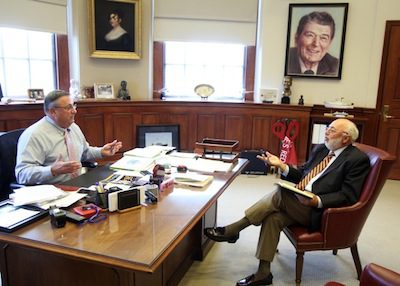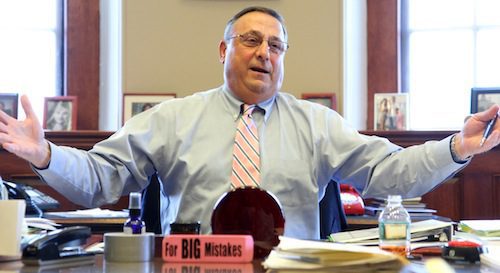In Nov. 16, 2010, Gov.-elect Paul LePage held his first press conference in the State House. Naomi Schalit, the Center’s executive director and senior reporter, and I cornered LePage, and told him we would be checking up on how he was doing.
“Give me two years,” he said.
I gave him two and half, figuring I would need some months after the two-year mark to gather data, do interviews and put the whole thing together.
The story published today was planned even earlier. During the election, Naomi and I committed to our board that we would apply our brand of independent journalism to whoever won.
Today’s 11,000-word story fulfills that commitment.
“The Book on Paul LePage: The ‘biggest, baddest person around crashes Augusta’s ‘nicey-nicey’ club” aims to give readers perspective and insight into the state chief executive.

Fully assessing LePage — or any governor — can’t be done with confidence until well after a governor leaves office.
Economic initiatives — to take one example — often take years to have a measurable effect.
But that doesn’t mean we can’t take our best shot at painting a picture of the governor more than half-way through his first — and perhaps last — term. With the election for governor a year away, the time was right to give readers the best assessment we could on LePage.
My technique was to do this by both examining his promises and his record (using data such as the unemployment rate), and interviewing a range of knowledgeable people. They include a few of his oldest friends and some typical voters, but most of those interviewed come from the world LePage has occupied — perhaps dominated — for the past 34 months. While I tried for a range of opponents and supporters, we felt it was even more important to interview people with a reputation for independent thinking, insight and experience in Augusta.
I didn’t try to cover every single event of the LePage era to-date. At 11,000 words, the story was already five times longer than even a long Sunday story. Instead, I focused on the major themes and topics such as taxes, jobs, debt, welfare, business, energy, the environment, etc. and LePage’s leadership.
The story as published on our web site includes many links for those wanting to read even more about LePage and those issues.
The story also draws on three interviews with LePage, probably the most extensive interviews he has done to date. Why did he grant us that sort of access? Simplest answer — we set it up way back at that early press conference. Then, when the time came to get started on this story, I went to his press people, said I wanted to do the full story of the LePage tenure as planned — “the good, the bad and ugly,” I recall telling Adrienne Bennett, his press secretary.
No ground rules. Everything on the record. And we would need ample time.
In the end, I had a 90-minute lunch at the Blaine House with LePage, his wife, Ann, and Peter Steele from the press office; time in a car down and back from a Portland event; and a shorter interview in the governor’s office.
Getting that level of access was probably helped by fact that I have known LePage for a dozen years. When he was general manager of Marden’s surplus and salvage stores, I was publisher of the Kennebec Journal and the Morning Sentinel, the Waterville daily. He was an advertiser and a public official — our paths crossed at the sort of events and meetings business and community leaders find themselves at all the time.
There was nothing partisan about these encounters — I rubbed shoulders just as often with LePage’s Democratic opponent, Libby Mitchell, for example. It came with the jobs we all had at the time.
Credit for any insights or revelations about LePage in this story goes to the two dozen-plus people who granted me hours of their time and answered my questions candidly and on the record.
To go to the main story, “The Book on Paul Lepage: The ‘biggest, baddest person around’ crashes Augusta’s “nicey-nicey” club,” click here.







